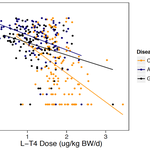![FT4 levels depend on diagnosis and SPINA-GD [Midgley et al. 2015]](https://lifescience.s3.amazonaws.com/CACHE/images/user/photos/2015/08/23/midgley_2015a/873e09887dfccfd708aa0e648db4b569.jpg)
Substitution therapy with levothyroxine is easy in 90% of persons affected from hypothyroidism. 10%, however, suffer from so-called syndrome T, i.e. poor quality of life despite normal TSH levels. Results of a recent study could explain, why dosage requirements are different in some patients.
Recently, results of a trial with 353 hypothyroid subjects on steady-state L-T4 replacement dose disease were published in Endocrine Connections.
The study revealed that substitution dose was independently associated with gender, age, aetiology of hypothyroidism and total deiodinase capacity (SPINA-GD, all p<0.001). Stratifying patients by deiodinase activity categories of <23, 23-29 and >29 nmol/s revealed an increasing FT3-FT4 dissociation; the poorest converters had the lowest FT3 concentrations in spite of highest dose and circulating FT4 levels (p<0.001).
According to the authors these findings imply that a) thyroid hormone conversion efficiency is an important modulator of the biochemical response to levothyroxine, b) FT3 concentrations may be an additional treatment target, and c) L-T4 dose escalation may have limited success to raise FT3 appropriately in some cases.
Cover image: FT4 levels depend on diagnosis and SPINA-GD [Midgley et al. 2015]
References
Midgley JE, Larisch R, Dietrich JW, Hoermann R. Variation in the Biochemical Response to L-Thyroxine Therapy and Relationship with Peripheral Thyroid Hormone Conversion. Endocr Connect. 2015 Aug 11. pii: EC-15-0056. [Epub ahead of print] PubMed PMID: 26265111. doi 10.1530%2FEC-15-0056
Stats
- Recommendations +1 100% positive of 1 vote(s)
- Views 2152
- Comments 0
Recommended
-

Johannes W. Dietrich
Adjunct Professor | Medical Faculty, Ruhr University Bochum
Also:
- Elected member | Leibniz Society of Sciences
- Member | Center for Thyroid Medicine Ruhr University Bochum
- Head | Zentrum für Diabetes-Technologie (ZDT) Blankenstein Hospital
- Head | Zentrum für seltene endokrine Erkrankungen / Centre for Rare Endocrine Diseases Ruhr University Bochum
- Head | Diabetes Centre Bochum/Hattingen Blankenstein Hospital
- Head | Sektion Diabetologie, Endokrinologie und Stoffwechsel Ruhr University Bochum
- Collaborator | CeSER - Centrum für Seltene Erkrankungen (ZSE) der Ruhr-Universität Bochum und der Universität Witten-Herdecke Ruhr University Bochum
- Medical Advisor | Thyroid UK
- Clinical cooperation partner and statistical advisor | KreLo Medical Diagnostics
- Cofounder, Shareholder | INSTRUCT AG
 Image 1
Image 1